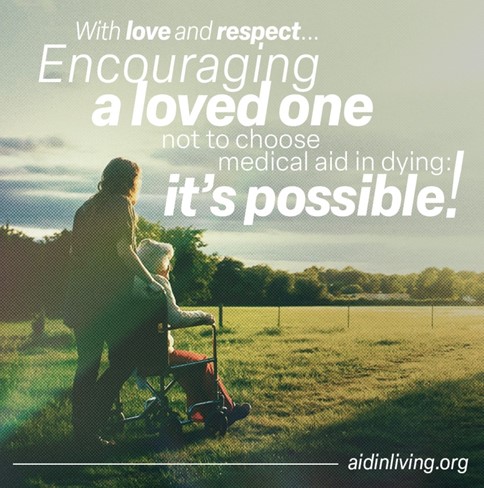10 years after the adoption of the Act respecting end-of-life care

Quebec City, May 13, 2024 – 10 years after the adoption of the Act respecting end-of-life care, on June 5, 2014, the Living with Dignity citizen network is launching a radio and internet awareness campaign on the theme of aid in living.
More than a dozen radio stations across Quebec will broadcast a resolutely constructive 30-second message this week, reminding us that it’s still possible to encourage a loved one not to choose medical aid in dying. It’s a message delivered with love, respecting both the final choice of the loved one and the limits of the relative or friend.
To hear the radio ad,
visit the citizen network’s YouTube channel.
Listeners to this campaign are invited to visit the webpage
(or aideavivre.org in French)
where they will find concrete suggestions for encouraging a loved one to opt for aid in living rather than medical aid in dying.
The Living with Dignity citizen network hopes that this campaign will contribute to freeing people to speak out on end-of-life issues. It encourages information, dialogue and support, while highlighting the treasure of palliative care.
Excerpts from aidliving.org :
On the context of this Campaign :
More often than not, people who disagree with a loved one’s choice to request medical aid in dying are silent or reluctant to broach the subject directly. This silence is often due to a fear of damaging the existing relationship, or of restricting the loved one’s freedom in such a personal matter. The Living with Dignity citizen network is convinced that speaking out freely and respectfully can, on the contrary, have a positive impact on the relationship, on the patient’s eventual end of life and on the grief
experienced by the family member or friend who chooses to speak out.
On the fear of becoming a burden :
Fear of becoming a burden was cited by 46% of MAiD recipients in Quebec in 2022-2023. And 76% felt that they had lost their dignity. On the other hand, tables extracted from page 55 of the most recent report by the Quebec Commission on End-of-Life Care (in French) show that only 4 of the 5037 people who received MAiD cited physical suffering alone. Since mental suffering is a determining factor, family and friends have a crucial role to play in responding effectively, to the best of their ability.
On accompanying your loved one :
What will the listening and dialoguing stages achieve? You are probably hoping they will lead your loved one down paths other than medical aid in dying. If this is the case, you should be aware that such a decision can change, and that it will be up to you to keep the lines of communication open so that you can talk again, if need be. During your dialogue, you may have committed to specific actions. It is important that your loved one realizes that you keep your promises and will carry out these actions. It will also be important to remind family and friends of words and gestures that will warm your loved one’s heart, so that he or she feels well supported throughout all the stages leading up to his or her natural death.
If your relative or friend nevertheless chooses to go ahead with MAiD, you will be called upon to continue your support, respecting both his or her choice and your limits (to be communicated to his or her entourage).
– 30 –
For interviews about this campaign :
Jasmin Lemieux-Lefebvre
Coordinator
Living with Dignity citizen network
info@vivredignite.org
MAY
2024
